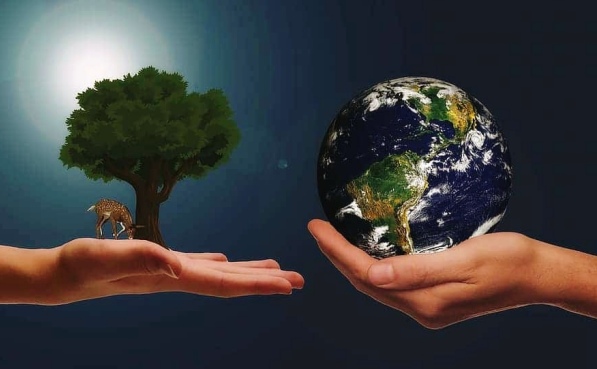• As of January 2017, there are 417 National Parks – land specifically set aside to protect animals, habitats and ecosystems from becoming parking lots. Furthermore, as of 2015, there are 25,800 protected areas – one-tenth of the protected land area of the world – set aside by different federal, state, tribal and local level. That includes lands for Native Americans, reservations or areas called Indian Colonies to the tune of 49,933 square miles.
People can hike, camp, explore, hit that mental reset button, get perspective in life about how beautiful nature is and see animals in their natural habitat as opposed to let’s say in a zoo. A great way for individuals and families to reconnect with nature, or for families to reconnect with each other and for kids to learn to respect other forms of life and the environment.
• Assistance to low-income families through welfare, WIC, or food stamps helping feed kids who wouldn’t otherwise be able to eat, helping moms and dads through hardships and not be stuck on survive.
• The abolitionist movement to not only put an end to the Atlantic Slave Trade but set slaves in America free is a fine example of when America was great over and over again. While the movement is commonly associated with the American Civil War, it actually had its start before America was even officially a nation through the likes of Samuel Groton and the giant local figure Roger Williams in the 1650s.

In the early 1680s, the Mennonites made public protests against slavery. These Germans (ironic considering how Germans are typically associated with Aryan Supremacy and Nazis today) that came to America would join forces with local Quakers and write the first formal protest against slavery in the United States.
“There is a saying that we shall doe to all men like as we will be done ourselves; making no difference of what generation, descent or color they are. And those who steal or rob men, and those who buy or purchase them, are they not all alike? Here is liberty of conscience which is right and reasonable; here ought to be liberty of ye body, except of evil-doers, which is another case. But to bring men hither, or to rob and sell them against their will, we stand against.”
You can read the full document here.
Over the next decades and centuries, many white Christians, Quakers, Conservatives and other denominations alike would speak out against the slave trade and slavery on the grounds of it being inhumane and un-Christian-like. At that time Conservatives could be considered the original progressives demonstrating that it is more a social movement that than an aspect of a political party.
Abolitionist societies like the Society of Friends, Society for the Relief of Free Negroes Unlawfully Held in Bondage, the American Anti-Slavery Society, the New York Manumission Society, the Anti-Slavery Convention of American Women and other Americans would band together in protest to the entire idea of slavery, many member were not only white, but well-to-do even wealthy.
Some of the biggest names in history would attach themselves to the cause like thinker, political theorist, philosopher Thomas Paine, the legendary Benjamin Franklin, Susan B. Anthony, vice-president Aaron Burr, presidents Alexander Hamilton and Thomas Jefferson (who wrote strong anti-slavery language in the original draft of the Declaration of Independence), Angelina and Sarah Grimké among others. Many were slave owners but would have not only a change of heart but would spearhead or spur on the abolitionist movement and use their influence.

Vermont would be the first state to enact the abolition laws in 1777, and most states north of the Mason–Dixon would shortly follow. While Massachusetts has the infamous distinction of being the first colony to own slaves and being a major hub for the Atlantic slave trade, we didn’t wait for the US to pass the 13th Amendment in 1865 abolishing slavery – we abolished it almost a hundred years earlier by the judiciary through case law.
Laws and ordinances like the Northwest Ordinance of 1787, Tallmadge Amendment, Lord Dunmore’s Proclamation and others would deal crushing blows to slavery, and of course, the Emancipation Proclamation would be the coup de grace. To put this in perspective, slavery is still alive and well today in many middle eastern nations and even African nations. Certainly, there are segments of American society that would feel those nations are great, yet ours isn’t.
• Out of the approximately 650,000 people – 20% of which were under the age of 18 – that died in the American Civil War, about 80,000 were slaves and 350,000 died in battle, through disease, starvation in POW camps, or succumbed to their injuries. 40,000 people in total were so obliterated as to be unidentifiable and those families were never able to mourn over remains or a gravestone.
This was a massive sacrifice by many white Americans, many who fought right alongside their fellow black Americans. For all the wrongs that many white men in America have been fairly faulted for, they should also get credit for their sacrifices. I guarantee that many of them were still racist, but set aside their prejudices because they felt their values, humanity, and morality was more important. I know in this day of black and white – pardon the pun – it’s hard to believe that a racist would make a sacrifice for black people, but it has and does happen.

I personally have and had racist friends – people who believe in the stereotypes prevalent today. Some of them were business owners and in spite of the prejudiced views, they never once made it known to not hire minorities or people of color, because they also had other values and felt that it would be simply wrong to do that.
Curiously, Irene Triplett is still receiving a pension check today from the Department of Veterans Affairs because of her father Moses, a Confederate-turned-Union soldier, fought in the war.
 New Bedford Guide Your Guide to New Bedford and South Coast, MA
New Bedford Guide Your Guide to New Bedford and South Coast, MA







